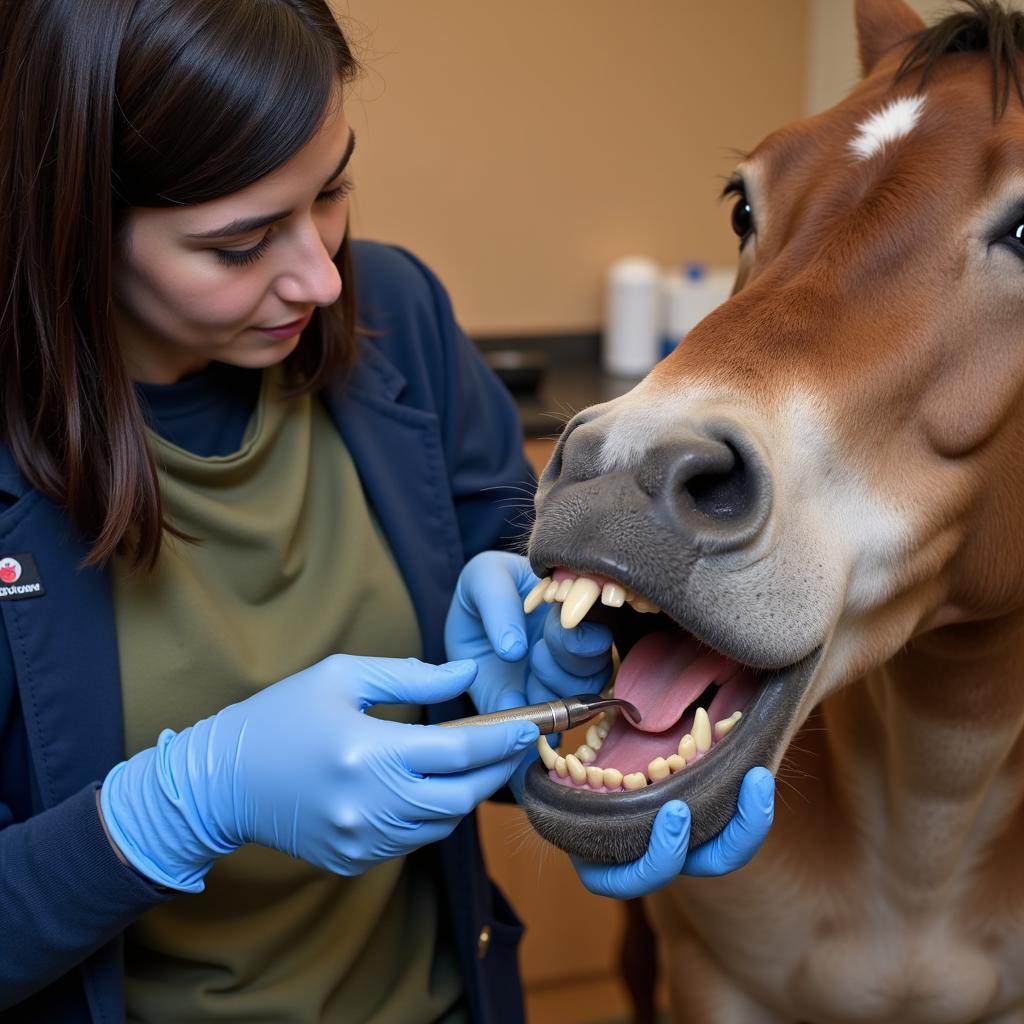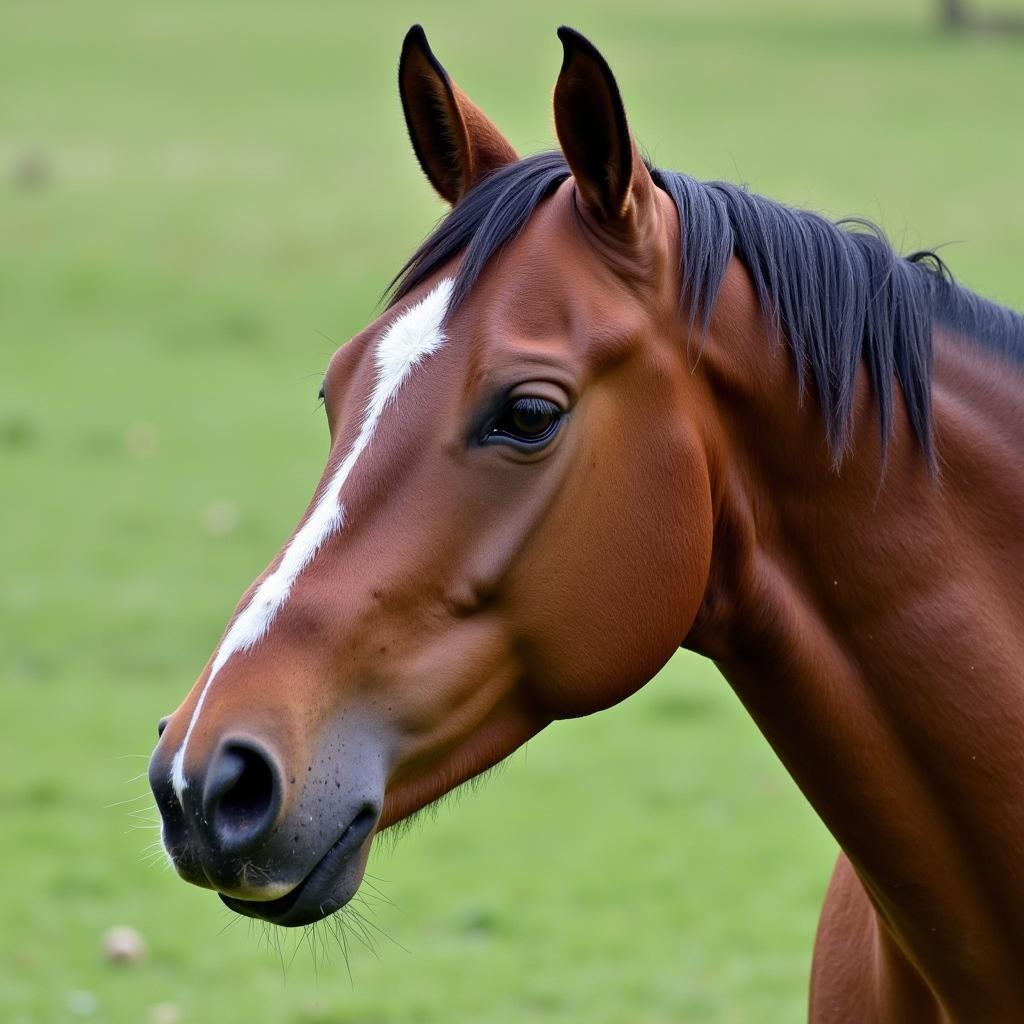Long Face Horse breeds are often admired for their elegant appearance and unique characteristics. But what exactly constitutes a “long face” in a horse, and what are the implications for their care and management? This article delves into the fascinating world of long-faced horses, exploring their defining features, potential health concerns, and the breeds that commonly exhibit this distinctive trait.
Defining the “Long Face” in Horses
A “long face” in a horse refers to a head that appears proportionally longer than average. This can manifest in various ways, such as a longer muzzle, a more pronounced forehead, or a combination of both. While there’s no strict scientific definition of a “long face,” it’s a visually recognizable characteristic that often distinguishes certain breeds. It’s important to differentiate between a naturally long face and an abnormally long face, which could indicate underlying health issues. A naturally long face is simply a breed characteristic, whereas an abnormally long face may be a sign of pituitary pars intermedia dysfunction (PPID), also known as Cushing’s disease. Understanding this difference is crucial for responsible horse ownership.
After this opening paragraph, I wanted to share a link about horse tack shops, as it’s a relevant topic for any horse owner. Check out horse tack shops for more information on finding the right equipment for your equine companion.
Common Long Face Horse Breeds
Several horse breeds are known for their characteristically long faces. These include the Thoroughbred, Arabian, and the American Saddlebred. While each breed has its unique conformation, the long face is a common thread that contributes to their overall elegance and refinement. For example, the Arabian’s dished face and long, slender muzzle are considered hallmarks of the breed, while the Thoroughbred’s long face is often associated with its athleticism and speed.
Health Considerations for Long Face Horses
While a long face is often aesthetically pleasing, it’s essential to be aware of potential health concerns that can be associated with certain long-faced breeds. For instance, dental issues can be more prevalent in horses with long heads, due to the increased space available for teeth to grow and potentially misalign. Regular dental checkups are therefore crucial for these breeds. Another consideration is the potential for sinus problems, as the elongated nasal passages can be more susceptible to infections.
It’s important to consult with a veterinarian to discuss specific health concerns related to your long-faced horse breed. Understanding these potential issues can help you provide the best possible care and prevent future complications. Just like with the bond between man and the horse, care is essential.
Managing Dental and Sinus Issues in Long Faced Horses
Regular dental care is paramount for long-faced horses. Annual or even bi-annual checkups with a qualified equine dentist can help identify and address any dental problems early on, preventing more serious complications. Maintaining good sinus health involves ensuring proper ventilation in the stable and avoiding exposure to dusty or moldy environments. Prompt veterinary attention should be sought if any signs of sinus infection, such as nasal discharge or facial swelling, are observed.
 Long Face Horse Dental Care
Long Face Horse Dental Care
Beyond the Breed: Individual Variation in Long Face Horses
While breed plays a significant role in determining facial characteristics, individual variation exists within every breed. Not all horses within a “long-faced” breed will exhibit the same degree of facial length. Factors such as genetics, age, and even nutrition can influence the overall shape and length of a horse’s head.
Remember, every horse is an individual, and what constitutes a “long face” can be subjective. The key is to understand the typical facial characteristics of your horse’s breed and to monitor for any changes that could indicate a health concern. You can even learn more about stable sizes, like an 8 stall horse barn, which can impact a horse’s health.
Why Do Some Horses Have Longer Faces?
The length of a horse’s face is largely determined by genetics and breed characteristics. Selective breeding over centuries has shaped the conformation of different breeds, resulting in the diverse range of facial structures we see today. While the exact genetic mechanisms responsible for facial length are complex, it’s clear that heredity plays a crucial role.
 Long Face Horse Profile
Long Face Horse Profile
Conclusion: Appreciating the Long Face Horse
Long face horses bring a unique beauty and elegance to the equine world. Understanding the characteristics, potential health considerations, and individual variations within these breeds is crucial for responsible ownership. By providing appropriate care and management, we can ensure the health and well-being of these magnificent animals. Remember to consult with a veterinarian for specific advice tailored to your horse’s individual needs. The long face is just one aspect of these remarkable animals, and appreciating their unique qualities enhances the bond between horse and owner. While you’re learning about horses, you might also be interested in the differences between a horse conch vs queen conch.
FAQ
- What breeds are known for having long faces? Thoroughbreds, Arabians, and American Saddlebreds are commonly cited examples.
- Are there health concerns associated with long faces in horses? Yes, dental and sinus issues can be more prevalent.
- How often should a long-faced horse have a dental checkup? At least annually, or even bi-annually, is recommended.
- What can I do to maintain my long-faced horse’s sinus health? Ensure proper stable ventilation and avoid dusty or moldy environments.
- Do all horses within a “long-faced” breed have the same facial length? No, individual variation exists within every breed.
- What causes some horses to have longer faces than others? Genetics and breed characteristics are the primary factors.
- Where can I find more information about horse care? You can explore various resources online and consult with equine professionals.
Need assistance? Contact us 24/7:
Phone: 0772127271
Email: [email protected]
Address: QGM2+WX2, Vị Trung, Vị Thuỷ, Hậu Giang, Vietnam.